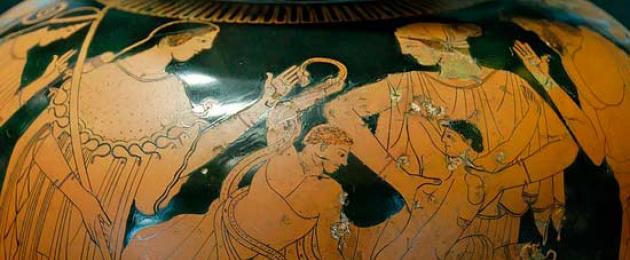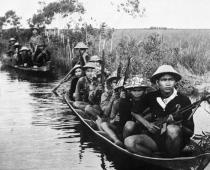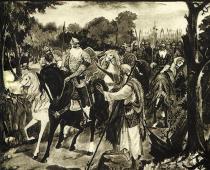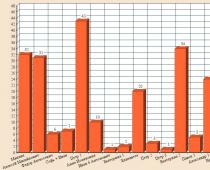Hercules (among the Romans - Hercules) was the son of Zeus. His mother Alcmene and stepfather Amphitryon belonged to the glorious Argive family of the Perseids, and both were grandchildren of the great hero Perseus. Hercules himself was the greatest of the heroes of antiquity, a man of great strength, invincible courage, who set himself the task of being invariably obedient to the will of his father Zeus and advocating for the good of people with everything unclean and evil, even if this is combined with labors and dangers. Hercules is an extremely honest nature, he deserves the happiest fate, but an evil fate haunts him from his very birth, and only after living a life full of the greatest efforts and suffering, he is rewarded for his exploits with immortality and communion with blessed gods. The misfortunes of Hercules begin from his very birth. He was born in a foreign land, in exile. His stepfather Amphitrion accidentally killed his father-in-law Electryon and for this he was expelled by his brother Sthenel from Argos - his homeland. Together with his wife, he sought refuge with his maternal uncle, the Theban king Creon, who received him in a friendly manner and washed away his grave crime. In Thebes, at the place of exile of his stepfather, Hercules was born; but his father Zeus decided to give him dominion over the land of Argos - the kingdom of the Perseids. On the day of his birth on Olympus in the assembly of the gods, full of the brightest expectations, Zeus said: "Listen to me, all the gods and goddesses! Now one will be born who will rule over all the offspring of Perseus and over all Argos." The wife of Zeus Hera, who jealously guarded her marital rights, was angry at her husband’s boast and slyly replied: “You are lying, Kronion; your word will never be fulfilled. Argos, over the Perseids, descended from your blood." Zeus did not notice his wife's tricks and took an oath. Then Hera rushed from the top of Olympus to Argos, where, as she knew, Sthenel's wife was soon to give birth. Hera, as the goddess of childbirth, ordered that Sthenel's wife give birth to a live child before the term, and at the same time slowed down the birth of Alcmene. The goddess returned to Olympus and said to Zeus: "Hear me, father Zeus: Eurystheus was born, the son of Sthenel, from your family; he will rule over all the Argives." Saddened, angry Kronion that deceived him Ate (the personification of foolishness, obscuration of the mind); and in anger he grabbed Ate by the hair and threw her from Olympus, and she fell to the ground among the people; and Zeus swore a terrible oath that Ata would never return to the council of the gods. Hercules, it is true, was born on the same day; but the birthright gave Eurystheus dominion over the whole family, it became - and over him. Thus the strong was subject to the dominion of the weak; and subsequently Zeus, seeing how his son languished, serving Eurystheus, more than once repented of his fatal haste. But he turned this mistake for the benefit of his son by concluding an agreement with Hera, according to which Hercules, having completed the twelve labors that Eurystheus will entrust him with, will become involved in immortality. And so that Hercules would not be exhausted from his difficult exploits, he sends his daughter Pallas Athena as a good assistant in his labors. Together with Hercules, Iphicles, the son of Amphitryon, was born. As soon as Hera found out that two children were born into the world and lay in swaddling clothes, prompted by anger, she sent two huge snakes to destroy the little ones. They quietly crept through the open doors into Alcmena's bedroom and were ready to grab the babies with their gluttonous mouth, but Hercules raised his head and tested his strength in the first struggle. With both hands he grabbed the snakes by the neck and strangled them: terrible monsters became lifeless. Horror seized the servants at the bedroom of Alcmene; naked, without memory, they rush from their beds to stop the monsters. Quickly, at their cry, a crowd of Cadmean knights in copper armor fled; Amphitrion also comes running in fear with a drawn sword.
Amazed, he stopped, full of fear and at the same time full of joy: he saw unheard-of courage and strength in his son. Then he ordered to call his neighbor, the great Zeus prophet Tiresias, and he predicted to him and the whole assembly the fate of the baby: how many wild animals he would destroy on land and at sea, how many wild and arrogant people he would put to death. Even when the gods begin to fight the giants on the Phlegraean field, and then many brilliant heads will be thrown into the dust with his arrows. Finally, he will enjoy eternal peace in peace - a worthy reward for his great labors. In the halls of the gods, he will marry the blooming Hebe, and Zeus, Kronos' son, will have a wedding feast, and he will enjoy a blessed life. With these few words, the prophet outlined the whole fate of our hero.

Baby Hercules strangling snakes
Amphitryon was convinced of the great destiny of his pet and gave him an upbringing worthy of a hero. He instructed the most excellent experts in the field to teach Hercules the art of war. Archery was taught to him by Eurytus, the most famous archer of his time; martial arts - the cunning and skillful Autolycus, the son of Hermes, the grandfather of the cunning Odysseus; to wield heavy weapons - Castor, one of the Dioscuri. Amphitrion himself taught him to drive a chariot: he was especially experienced in this art. Then the warrior needed the ability to drive a chariot, since in battles they fought from war chariots. In addition to this physical and military education, the boy's spirit was to be developed by the arts and sciences. But it seems that the young Hercules did not make the desired success in them. At least the teacher often had reason to censure and punish him. Once he hit Hercules, which caused him to become very angry and hit the teacher on the head with a cithara. The blow was so strong that Lin fell dead on the spot. The boy was brought to trial for murder; but he justified himself with the saying of Rhadamanthus: the struck must return the blow, and he was acquitted.
Amphitrion was afraid that the boy would not do any more such tricks in the future tense, removed him from the city and sent him to his herds on the Kiferon mountains. Here he grew up as a strong young man and surpassed everyone both in size and strength. From the first time it was possible to recognize in him the son of Zeus. He was six feet tall and had powerful limbs. His eyes shone with a fiery gleam. In archery and javelin throwing, Hercules was so skilled that he never missed.
While Hercules was on Cithaeron, still an eighteen-year-old youth, he killed the terrible Cithaeron lion, which often, descending into the valley, strangled his father's bulls. Hercules threw the skin of the slain lion over himself so that it descended from his back, with his front paws tied at his chest, while his mouth served as a helmet. This was the first feat performed by Hercules for the benefit of people. When Hercules was returning from this hunt, he met the ambassadors of the Orchomenian king Ergin, who were going to Thebes to collect tribute, which the Thebans were supposed to hand over to them. For the fact that one Theban killed the father of Ergin Klimen, the Orchomenian king went to war against Thebes and forced them to pay 100 bulls annually for twenty years. When Hercules met the ambassadors, he began to torment them: he cut off their noses and ears, and, tying their hands behind their backs, sent them with this tribute to Orchomenus to the king.
This insult led, of course, to a war between Orchomenus and Thebes. Ergin set out with a large army, but Hercules, in marvelous, brilliant armor, presented to him by his assistant and friend Athena, became the head of the Theban army, defeated the enemy army and killed the king with his own hand. With this victory, Hercules not only freed the Thebans from the shameful tribute, but also forced the Orchomenians to pay (the Thebans) a double tribute. Amphitryon fell in battle. He distinguished himself with courage in the same way as Hercules' brother Iphicles. Both brothers were rewarded by the grateful King Creon for their heroic deeds. He gave Hercules his eldest daughter Megara in marriage, Iphicles his youngest daughter.
When Hercules celebrated his marriage to Megara, the celestials descended from Olympus and took part in a brilliant festival, as in the old days in the wedding feast of Cadmus and Harmony, and gave the hero the most excellent gifts. Hermes gave him a sword, Apollo - a bow and arrows, Hephaestus - a golden shell. Athena - beautiful clothes. Heracles later cut down his club for himself in the Nemean grove.
- In contact with 0
- Google Plus 0
- OK 0
- Facebook 0








